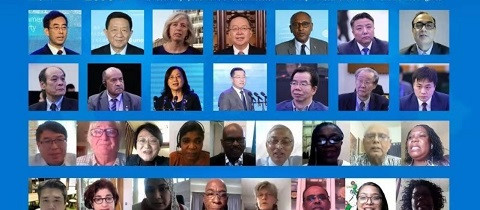
GCED Basic Search Form
Quick Search
أنت هنا
الأخبار

Sharing the experience of poverty alleviation through education and promoting global 2030 agenda for sustainable development
On 31 March, the International Symposium on the Role of Education in Poverty Alleviation was held in Beijing, Peoples’ Republic of China. The conference focused on the United Nations Sustainable Development Goals, discussed the relationship between education and poverty reduction, focus on SDG1 and SDG4 and shared China’s successful practices and experience in poverty alleviation through education. The symposium was guided by the 4 Ps of Sustainable development, planet, prosperity, people and partnerships to leave no one behind. Education as key to achieving all the SDGs and 2030 Agenda for Sustainable Development. The Opening session of the symposium was moderated by Mr Qin Changwei, Secretary-General of the China National Commission for UNESCO and warmly welcomed all the participants from China and around the world.

Mr. Tian Xuejun, Vice Minister of Education of China and Chairperson of the Chinese National Commission for UNESCO, Mr. Firmin Matoko, Assistant Director-General for Priority Africa and External Relations at UNESCO, and Ms. Stefania Giannini, Assistant Director-General for Education at UNESCO, delivered opening remarks at the event.

Mr. Tian pointed out that poverty is a common challenge for the human race, and poverty eradication is deemed as the top priority in the UN 2030 Agenda for Sustainable Development. The Chinese government has been continuously engaged in tackling poverty and has formulated a roadmap of poverty reduction with Chinese characteristics in which education plays a key role. China’s poverty reduction strategic plan targeted all sectors including education that has significantly contributed to improved schooling conditions in impoverished areas, designed a comprehensive system to subsidize students with financial difficulties, prioritized TVET and adult education for impoverished population, and mobilized the expertise and strengths of higher education institutions to promote industry-driven development that helps poverty-stricken areas achieve common prosperity. Mr. Tian emphasized that the Chinese government is willing to adhere to the principle of building “a community of shared future for mankind”, to strengthen international cooperation, especially with the member states of UNESCO, and to intensify support to developing countries in sharing experience and effective practices for poverty eradication so as to advance the implementation of the 2030 Agenda.

Mr. Matoko expressed appreciation for the great success of poverty reduction in China. He pointed out that developing quality education for all plays a key role in socio-economic development. As evidence suggests, education has the greatest potential to break the cycle of transmission of poverty between generations. One of the most important factors contributing to China's success in poverty alleviation is the development of quality education. China’s experiences in linking education and poverty alleviation demonstrated the important role of education and skills training in poverty eradication. He believed that China, as one of the key partners and founding Member States of UNESCO, will contribute significantly to the world with experience and best practices in poverty alleviation through education an achievement that is human centered and a shared prosperity with the rest of the world.

Ms. Giannini commented on the timeliness of this symposium and spoke of the significance of equitable, inclusive and quality education in poverty alleviation. She praised China's support for the UNESCO Global Education Coalition for COVID-19 Response and the nation’s efforts in ensuring learning continuity during the pandemic.

Experts and officials from international organizations, UNESCO, Non-Governmental organizations and countries participated at the global symposium agreed that China has achieved SDG1 10 years ahead and made significant contribution to the global poverty reduction strategy and targets. China’s experience can provide useful guidance for other developing countries to achieve the UN Sustainable Development Goals by 2030. The participants at the global symposium discussed critical link between SDG1 and SDG4. It was suggested for China to share its experience, prosperity and practices in poverty alleviation through education, increase exchanges and cooperation with other nations, so as towards a joint exploration of paths of poverty reduction for the international community.
Prof. Khan, moderator for the first session of the symposium under the theme of global policy dialogue on linkages between education and poverty alleviation. He highlighted the unique model and critical linkage between education and poverty alleviation and China’s success story must be shared with the rest of the world.
Professor Zhou Zouyu, Vice President Beijing Normal University, moderated the second session that focused on Innovations and best practices on the contribution of education towards poverty alleviation for sustainable development. Prof. Zhou reaffirmed Beijing Normal University’s commitment towards poverty alleviation and deployment of university experts in rural parts of China.
Professor Zeng Xiadong from INRULED moderated the third session on sharing key findings of the final report on education for poverty alleviation under the framework of 2030 Agenda.
Mr. Liu Changya, the Director-General of the Department of Development Planning of Ministry of Education, made the keynote presentation. He presented the core policy priorities, strategies and key achievements of China the contribution of education to poverty alleviation.
Professor Wang Li and Deputy Director of INRULED presented the key findings of the final report with the case studies highlighted the 5 key factors (5D) in poverty alleviation through education, which are: 1. Determined Leadership, 2. Detailed Blue print with key targets, 3. Decentralized delivery, 4. Development oriented and human centered and 5.Data-based governance.

The symposium was hosted by the UNESCO Category II Centre - the International Research and Training Centre for Rural Education (INRULED), with support from the Chinese National Commission for UNESCO, Beijing Normal University, and the UNESCO Beijing Cluster Office. More than 100 education officials and experts including 20 experts from UNESCO and other international organizations, Non-governmental organization, Ministries of Education participated in the Symposium. The participants and presenters were from Asia and the Pacific, Europe, Africa, North America.
URL:
https://en.unesco.org/news/international-symposium-role-education-poverty-alleviation
